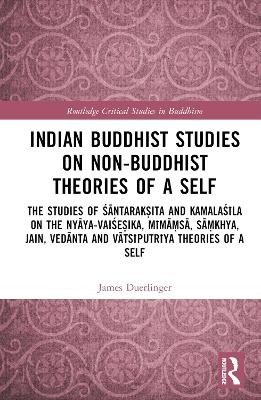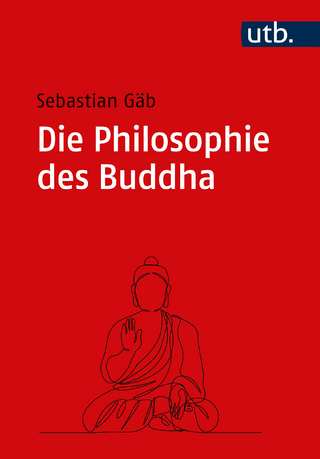
Indian Buddhist Studies on Non-Buddhist Theories of a Self
The Studies of Śāntarakṣita and Kamalaśīla on the Nyāya-Vaiśeṣika, Mīmāṃsā, Sāṃkhya, Jain, Vedānta and Vātsīputrīya Theories of a Self
Seiten
2022
Routledge (Verlag)
978-1-032-29930-3 (ISBN)
Routledge (Verlag)
978-1-032-29930-3 (ISBN)
This book addresses prominent views on the nature of the self in Indian philosophical traditions and presents Buddhist critiques of those conceptions through Śāntarakṣita’s chapter in the Tattvasaṃgraha and Kamala-śīla’s commentary in Tattvasaṃgrahapañjikā. This will be of interest in Philosophy, Religious Studies and Buddhist Studies.
This book addresses prominent views on the nature of the self in Indian philosophical traditions and presents Buddhist critiques of those conceptions through the translation and commentary on Śāntarakṣita’s chapter in the Tattvasaṃgraha on theories of a self and Kamala-śīla’s commentary on it in his Tattvasaṃgrahapañjikā.
The book is comprised of an introduction presenting the theories of a self in the Indian Buddhist Middle Way philosophies and in the different philosophical schools Śāntarakṣita and Kamalaśīla study and offers a background for the translation. The detailed translation that follows reveals the theories of a self that are explained in the philosophical schools in India called the Nyāya-Vaiśeṣika, Mīmāṃsā, Sāṃkhya, Jain, Advaita Vedanta, and Vātsīputrīya. It is complemented by a thorough commentary by the author which brings the text to light for a modern audience.
A useful contribution to Indian philosophy and global philosophy, this book will be of interest to researchers in the fields of Philosophy, Religious Studies and Buddhist Studies.
This book addresses prominent views on the nature of the self in Indian philosophical traditions and presents Buddhist critiques of those conceptions through the translation and commentary on Śāntarakṣita’s chapter in the Tattvasaṃgraha on theories of a self and Kamala-śīla’s commentary on it in his Tattvasaṃgrahapañjikā.
The book is comprised of an introduction presenting the theories of a self in the Indian Buddhist Middle Way philosophies and in the different philosophical schools Śāntarakṣita and Kamalaśīla study and offers a background for the translation. The detailed translation that follows reveals the theories of a self that are explained in the philosophical schools in India called the Nyāya-Vaiśeṣika, Mīmāṃsā, Sāṃkhya, Jain, Advaita Vedanta, and Vātsīputrīya. It is complemented by a thorough commentary by the author which brings the text to light for a modern audience.
A useful contribution to Indian philosophy and global philosophy, this book will be of interest to researchers in the fields of Philosophy, Religious Studies and Buddhist Studies.
James P. Duerlinger is Professor of Philosophy at the University of Iowa, USA. He is the author of Indian Buddhist Theories of Persons: Vasubandhu's "Refutation of the Theory of a Self" (2003) and Refutation of the Self in Indian Buddhism: Candrakīrti on the Selflessness of Persons (2012), also published by Routledge.
Preface; Acknowledgements; Chapter One: Introduction to the Translation; Chapter Two: Translation and Commentary; Bibliography
| Erscheinungsdatum | 21.07.2022 |
|---|---|
| Reihe/Serie | Routledge Critical Studies in Buddhism |
| Verlagsort | London |
| Sprache | englisch |
| Maße | 156 x 234 mm |
| Gewicht | 390 g |
| Themenwelt | Geisteswissenschaften ► Philosophie ► Östliche Philosophie |
| Geisteswissenschaften ► Religion / Theologie ► Buddhismus | |
| Geisteswissenschaften ► Religion / Theologie ► Weitere Religionen | |
| Sozialwissenschaften ► Soziologie ► Spezielle Soziologien | |
| ISBN-10 | 1-032-29930-4 / 1032299304 |
| ISBN-13 | 978-1-032-29930-3 / 9781032299303 |
| Zustand | Neuware |
| Informationen gemäß Produktsicherheitsverordnung (GPSR) | |
| Haben Sie eine Frage zum Produkt? |
Mehr entdecken
aus dem Bereich
aus dem Bereich


